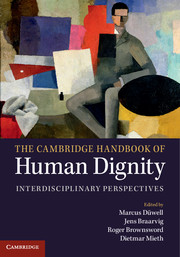Book contents
- Frontmatter
- Contents
- List of contributors
- Foreword
- Why a handbook on human dignity?
- Acknowledgments
- 1 Human dignity from a legal perspective
- 2 Human dignity: concepts, discussions, philosophical perspectives
- Part I Origins of the concept in European history
- Part II Beyond the scope of the European tradition
- Part III Systematic conceptualization
- Part IV Legal implementation
- 36 Equal dignity in international human rights
- 37 Is human dignity a useless concept? Legal perspectives
- 38 Human dignity in French law
- 39 Human dignity in German law
- 40 Human dignity in US law
- 41 Human dignity in South American law
- 42 Human dignity in South African law
- 43 The Islamic world and the alternative declarations of human rights
- 44 The protection of human dignity under Chinese law
- 45 Human dignity in Japanese law
- 46 The place of dignity in the Indian Constitution
- Part V Conflicts and violence
- Part VI Contexts of justice
- Part VII Biology and bioethics
- Appendix 1 Further reading
- Appendix 2 Universal Declaration of Human Rights
- Index
- References
42 - Human dignity in South African law
from Part IV - Legal implementation
Published online by Cambridge University Press: 05 March 2015
- Frontmatter
- Contents
- List of contributors
- Foreword
- Why a handbook on human dignity?
- Acknowledgments
- 1 Human dignity from a legal perspective
- 2 Human dignity: concepts, discussions, philosophical perspectives
- Part I Origins of the concept in European history
- Part II Beyond the scope of the European tradition
- Part III Systematic conceptualization
- Part IV Legal implementation
- 36 Equal dignity in international human rights
- 37 Is human dignity a useless concept? Legal perspectives
- 38 Human dignity in French law
- 39 Human dignity in German law
- 40 Human dignity in US law
- 41 Human dignity in South American law
- 42 Human dignity in South African law
- 43 The Islamic world and the alternative declarations of human rights
- 44 The protection of human dignity under Chinese law
- 45 Human dignity in Japanese law
- 46 The place of dignity in the Indian Constitution
- Part V Conflicts and violence
- Part VI Contexts of justice
- Part VII Biology and bioethics
- Appendix 1 Further reading
- Appendix 2 Universal Declaration of Human Rights
- Index
- References
Summary
In no legal system does human dignity play a greater role than in the South African one. The South African Constitution accords everyone ‘the right to have their dignity respected and protected’. It also recognizes human dignity as one of three values (the others are equality and freedom) upon which the Republic of South Africa was founded and which the South African Bill of Rights affirms.
Dignity as a right and as a value in South African law
Inconsistency with the right to dignity (like inconsistency with any other right in the Bill of Rights) is ground for a court to declare invalid a legal rule, whether it be a statutory, common-law or customary rule. Which legal rules are inconsistent with the right to dignity depends upon the scope of its application. That is: it depends upon whom the right binds. According to the Constitution, every one of the rights in its Bill of Rights, and thus also the right to dignity, binds the state. The Constitution does not, however, say whether the right also binds private persons. As with all the other rights in the Bill of Rights, the question whether the right to dignity binds private persons is left to the courts to determine, ‘taking into account the nature of the right and the nature of any duty imposed by the right’. Though this is not entirely clear, the South African Constitutional Court seems to have accepted that the right to dignity does bind private persons.
- Type
- Chapter
- Information
- The Cambridge Handbook of Human DignityInterdisciplinary Perspectives, pp. 401 - 406Publisher: Cambridge University PressPrint publication year: 2014



